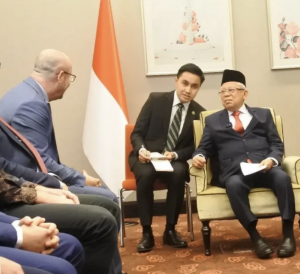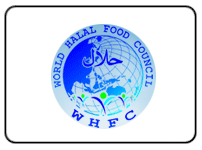Dewi Kurniawati The Jakarta Globe
Heggy Kearens was totally determined when she posted a status update on her Facebook wall questioning the motivations of some of her more pious friends.
They had recently joined a multi-level marketing scheme to sell a popular Swedish cosmetics brand distributed here. According to Heggy, two issues bothered her: First, there is the fact that the brand has no halal label on its products; second, she believes the whole concept of multi-level marketing is still a “grey zone” in terms of Islam because it allows one to profit from the labor of others.
So, the 25-year-old graduate student steamed ahead with her Facebook campaign. She wrote on her status message: “I am questioning the halal status of [the brand]. I know many of my friends are selling these products but according to twitter account @halalcorner, these products are not halal. My dear friends, please be careful, for the halal status, we can check them through halalmui.org.”
After that, she was barraged with comments from her friends, some of whom supported her concerns, while others disagreed. Some of the blowback came in the form of what she called “unpleasant” e-mails. She said she also got a few kicks on her twitter account.
“I intentionally posted that status because I know for a fact that many of my friends who were extremely devoted to Islam during college are now selling these products, which is an irony, because those products have no halal label.” It’s just too easy to swing away from being pious just for economic reasons, she said.
“We are talking about people who used to refuse to eat in a restaurant without a halal certificate,” Heggy said, adding that as a Muslim herself, she cares about using halal products, although she does not take the issue to extremes.
Is it Halal?
The halal label, of course, is used worldwide, but mostly in Muslim countries to ensure that the food and drink — and even cosmetics —that consumers are buying was made in accordance with Islamic law. In Indonesia, the label is meant to show that the product has been certified by the Indonesia Ulema Council’s (MUI) food and drug monitoring body to contain no traces of pork or alcohol.
The designation is also supposed to certify that animals used for food are slaughtered in accordance with Islamic law — with the animal dying immediately, the blood being drained away and the process dedicated to Allah. In the case of cosmetics, they should use plant extracts and minerals instead of alcohol and animal products, a particular concern since many cosmetics use rendered animal fats and swine placenta.
For some Indonesian Muslims, the voluntary halal label is the determining factor in their decision about whether to eat at a certain restaurant or buy particular products. For some international companies working in Indonesia, having the label is also crucial for selling their products because almost 90 percent of the population is Muslim, making it the world’s most populous Muslim country.
One of them, is Bilma Yulita, a mother of two daughters who lives in Jakarta. Bilma is a devout Muslim who believes that the halal label is an absolute necessity she must take into consideration before deciding to use a product, whether it be food or cosmetics.
“The halal label is my first sensor in choosing any product, and I teach my children to do the same,” she said, adding that her oldest daughter — who is now 8 years old — seems to have absorbed the lesson early because she is aware of the label and also refuses to consume products without the halal label.
“When she was in kindergarten, someone offered her food without the halal label, and she told me, ‘Mama I don’t want this.’ I was touched,” Bilma said.
For exactly the same reason, a year ago, Bilma stopped buying the Oriflame products that she had been using since 2008. “I heard that it had no halal label and so I stopped buying it,” she said. “I honestly think that MUI should label everything, so that Muslims can be free from doubt over what they use.
Indonesia’s Ministry of Religious Affairs introduced the halal certificate in 1994 and it has granted thousands of certificates since then for various types of food, beverages, and cosmetics. But MUI officials estimate that less than 15 percent of all products sold in the country have the halal label. The head of MUI’s Halal Assurance Division, Muslich, said food and beverage companies are more eager to get certification than cosmetic or drug firms, less than 10 percent of which seek out halal status.
Why Bother?
While some embrace the label as a matter of devotion to Islam, others consider the whole concept an extra chore and choose to ignore it. “I don’t care about the halal label and I don’t understand why some people would make a fuss about it and make their life more difficult,” said Andina Mustika Ayu, a graduate student at the University of Indonesia, shrugging her shoulders.
“I have tried halal cosmetics, but they are just not that good,” she added. Although a Muslim, Andina thinks the label is more political and business oriented, and as such, the MUI should stick to just labeling things that are forbidden.
Amidhan, the head of MUI, said despite growing public awareness of the label, the agency needs a legal umbrella to require all companies to put it on their products.
“The halal bill is still in the parliament. Some support it, but many oppose it,” he said. If the bill is passed, then all products produced and circulated in Indonesia would need halal certification before being allowed in the market — a step which would be unusual for a secular country.
Currently, MUI uses the Assessment Institute for Food, Drugs and Cosmetics and the body’s Fatwa Commission to certify products halal. The process lasts around two months and requires the inspection of a company’s ingredients, production, storage, display, packaging and transportation.
Selling Point
The cost? Companies pay between Rp 500,000 and Rp 4.5 million for a two-year certification — a modest sum that many companies will likely continue to see value in as a way to show respect for Muslims.
“I think companies should consider this an extra selling point instead of a burden,” said Amidhan. “We advise companies to put the halal certification fee in their promotional budgets.”
The importance of halal labels is not likely to go away anytime soon. The emergence of fake halal labels brought a flurry of complaints to the MUI body, which says it will install an sms hotline so consumers can check if a product is really halal.
“Now, if a company is faking its halal certification, the punishment is Rp 2 billion, or up to 5 years in jail,” Amidhan said.
But the option to follow halal guidelines, of course, goes back to the individual. In this case, Heggy Kearens agreed. “I care about it, but it’s a personal choice,” she said.



